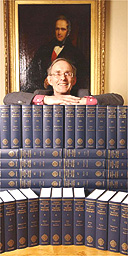
They launched a new reference book in London yesterday, but it was more like the flotation of one of the last great Edwardian ocean liners.
The new Dictionary of National Biography rolled down the slipway into bookshops and libraries with the mightiest of thuds - 61,440 pages long, stretching to 60 volumes, a snip at £7,500 (reduced to £6,500 on Amazon).
It can virtually claim - as the News of the World once did - that all human life is here, all British life at least. It offers contributions by 10,000 mostly learned contributors of 50,000 distinguished or celebrated dead people across 2,400 years of history.
Its span reaches from Pytheas, the 4th century BC Greek explorer who was the first to describe Britain, which he called Prettania, to the singing postman Allan Smethurst. Smethurst, who died shortly before the project's deadline two years ago, was briefly renowned for his Norfolk dialect record, Hev Yew Gotta Loight, Boy?'.
In between these two dates, the dictionary takes a cool look at the still heated topic of Diana, Princess of Wales. "Princes of Wales have been serial adulterers, domestic tyrants, even (in the case of George IV) bigamists," writes the scholar Kim Reynolds.
"But until Diana, all the princesses of Wales went into their marriages with their eyes open. Some, it is true, loved, or came to love, their husbands, but for none was love a prerequisite of the marriage, and none expected its return. Diana, in love with Charles and seeing in her marriage the fulfilment of her youthful fantasies, and, crucially, not bred in the royal tradition of dynastic marriage, was doomed to disappointment ... By the summer of 1986, both the prince and the princess had taken lovers".
And it revives the reputation of one of the most vilified 20th century politicians, Neville Chamberlain, the prime minister accused of risking Britain's survival by appeasing Adolf Hitler at Munich in 1939.
The historian Andrew Crozier writes, "No policy pursued by Chamberlain could have maintained peace.
"That he strove to avoid war, conscious of the vast human misery and material destruction it wrought, should redound to his eternal credit, for in doing so, as he told Hitler at Godesberg, he risked his political life ... Inevitably, he was diverted from focusing upon [social reforms] which would probably have made his premiership distinguished."
Yesterday, discussing the entry on Diana, the DNB's editor, Brian Harrison, said Ms Reynolds was a leading authority on women who had held behind-the-scenes influence. "She seemed to me to be the ideal person to write about Lady Di - and very good her article is too, warts and all."
In an article likely to be read for 100 years, as the dictionary's predecessor was, Ms Reynolds says of Diana: "Whatever her motivations - and they were probably as mixed as those of everyone else - they mattered little or nothing to those whom she met. If her much vaunted caring was an act, it was a thoroughly successful one; if her interest was feigned, for her public the impersonation was good enough to be taken for the real thing."
"People who met her, from hospital patients and charity workers to hardened journalists, spoke of her charm, her apparently genuine sympathy and interest; men in particular were entranced by a flirtatious manner which made them feel, for the time being, the most important person in the room."
The new DNB is the first revised edition for 117 years. The original volumes were edited by Sir Leslie Stephen, father of the novelist Virginia Woolf, with extra names added every 10 years. They became a world-famous cornerstone of British scholarship and culture, a trusted source for learning and education, with the prestige of the country's learned societies and great museums.
The revision took 12 years to edit and cost £25m, £3.7m of which came from the British Academy. Its publishers, Oxford University Press, do not expect to get their outlay back. But the work will gain new readerships through its website, oxforddnb.com. Online personal subscriptions are £195 a year (£50 for three months), library services pay from £1,200 to £3,000 depending how big they are.
Dr Harrison said: "It is a great Victorian monument revamped for the 21st century. It is an important cultural event, and a commercial one, and it has been published on time."
One of his favourite entries is Sir Charles Isham, thought to have invented the British garden gnome. The project director Robert Faber's favourite is the Norwich-born Victorian black circus performer and proprietor Pablo Fanque, "proficient in tumbling, posturing, leaping, rope-dancing and riding".
Mr Faber says the entry has at last thrown light for him on the meaning of a line in John Lennon's song Being For the Benefit of Mr Kite. The line goes:
The Hendersons will all be there
Late of Pablo Fanque's fair.
Sometimes it takes the legacy of 100 years of scholarship to explain such things.
John Ezard contributed the DNB's entry on Dame Barbara Cartland. Among other past or present Guardian contributors are Peter Preston and Dennis Barker.

